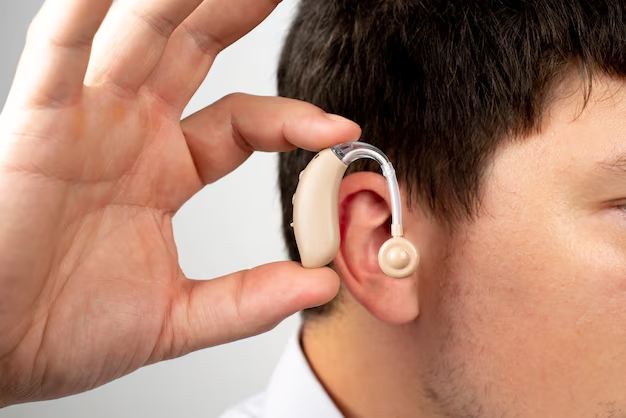Your Guide to Are Hearing Aids Tax Deductible
What You Get:
Free Guide
Free, helpful information about TAX FAQ and related Are Hearing Aids Tax Deductible topics.
Helpful Information
Get clear and easy-to-understand details about Are Hearing Aids Tax Deductible topics and resources.
Personalized Offers
Answer a few optional questions to receive offers or information related to TAX FAQ. The survey is optional and not required to access your free guide.
Are Hearing Aids Tax Deductible? Everything You Need to Know
Navigating the world of taxes can often feel overwhelming, especially when trying to determine what medical expenses are deductible. If you or a loved one relies on hearing aids, you may be wondering if the cost of these essential devices can be offset through tax deductions. The answer is yes, but with specific conditions and considerations. Let's delve into this topic to shed light on the complexities of tax deductions for hearing aids, offering clarity and guidance to help you make informed financial decisions.
What Are Medical Expense Deductions?
Medical expense deductions are a potential benefit that taxpayers can claim to reduce their overall taxable income. By understanding the ins and outs of what's deductible, you can effectively lessen your tax liability. Generally, medical expenses you paid out of pocket can be deducted if they exceed a certain percentage of your adjusted gross income (AGI). These expenses include costs for diagnosis, cure, treatment, and prevention of disease, and they must be primarily to alleviate or prevent a physical or mental disability.
Are Hearing Aids Considered Medical Expenses?
Yes, hearing aids qualify as a medical expense. Hearing aids, batteries, maintenance, and repair can all be included in your deductible medical expenses. The IRS recognizes hearing aids as necessary to alleviate hearing loss, making them a legitimate claim for tax purposes.
Beyond Hearing Aids
In addition to hearing aids themselves, the following associated costs might also qualify as medical expenses:
- Examinations to diagnose hearing loss
- Fitting expenses for the hearing aids
- Hearing aid batteries or other power sources
- Repairs and maintenance fees
How to Claim Hearing Aids as a Tax Deduction
To claim hearing aids as a tax deduction, follow these steps:
- Organize Your Receipts: Ensure you have accurate records of all purchases, including receipts and invoices related to your hearing aids and associated services.
- Itemize Your Deductions: On your tax return, you must itemize deductions using Schedule A (Form 1040). Note that itemizing is beneficial only when your total deductions exceed the standard deduction.
- Calculate Your AGI Threshold: You can deduct the amount of your medical expenses that exceed 7.5% of your adjusted gross income. It's essential to determine if your medical expenses, including hearing aids, surpass this threshold.
- Consult Tax Guidelines: Stay informed about the latest IRS guidelines and consult with a tax professional if needed to ensure compliance and maximize your deductions.
Common Questions About Hearing Aid Tax Deductions
Do All Hearing Aid Costs Qualify?
Generally, most costs related to hearing aids are deductible, provided they meet the IRS criteria for medical expenses. However, it's crucial to differentiate between eligible expenses and those that don't qualify, such as cosmetic enhancements or optional features not deemed medically necessary.
Can You Deduct Hearing Aids Bought for Dependents?
Yes, you can deduct the cost of hearing aids purchased for dependents, such as children or spouses, as long as they meet the IRS requirements for a deductible medical expense.
What if You Have Health Insurance Coverage?
Even with insurance, out-of-pocket expenses for hearing aids may still qualify for deductions. Be sure to calculate only the portion you paid yourself after insurance reimbursements.
Special Considerations and Tips
Disability Tax Credit
For individuals with profound hearing loss, exploring eligibility for a disability tax credit might be worthwhile. This option differs from deductions but can also provide financial relief for qualifying impairments such as severe hearing loss.
State Level Deductions
While federal deductions have specific rules, some states offer additional credits or deductions for medical expenses like hearing aids. It’s advisable to research state-specific provisions or consult a local tax expert.
In Summary: Tips for Tax Season 🎯
Here's a concise checklist to remember during tax season when considering hearing aid deductions:
- 📋 Document Everything: Keep detailed records of all hearing aid-related expenses, including receipts and health insurance statements.
- 🔍 Verify Eligibility: Check that all expenses meet IRS criteria for medical deductions.
- 🏷️ Assess AGI Impact: Calculate if your medical expenses exceed 7.5% of your AGI to be beneficial for itemized deductions.
- 🕵️ Seek Professional Help: If unsure, consult with a tax professional to navigate the complexities of medical deductions effectively.
- 📊 Monitor Changes: Stay updated on any changes in tax laws or IRS guidelines impacting medical expense deductions.
Closing Insight
Understanding the nuances of tax deductions for hearing aids can make a significant difference in your financial planning and tax return outcome. By staying informed and organized, you can take advantage of the available tax benefits, easing the financial burden of these essential medical devices. Remember, the assistance of a knowledgeable tax advisor can further ensure that you maximize your deductions and comply with all applicable regulations, providing you with peace of mind and potentially more savings at tax time.
What You Get:
Free TAX FAQ Guide
Free, helpful information about Are Hearing Aids Tax Deductible and related resources.

Helpful Information
Get clear, easy-to-understand details about Are Hearing Aids Tax Deductible topics.

Optional Personalized Offers
Answer a few optional questions to see offers or information related to TAX FAQ. Participation is not required to get your free guide.


Discover More
- a Sales Tax Is a Type Of
- a Tax Exemption
- Am I Tax Exempt
- Are 401k Contributions Tax Deductible
- Are 529 Contributions Tax Deductible
- Are 529 Plan Contributions Tax Deductible
- Are Association Fees Tax Deductible
- Are Attorney Fees Tax Deductible
- Are Campaign Contributions Tax Deductible
- Are Charitable Donations Tax Deductible
